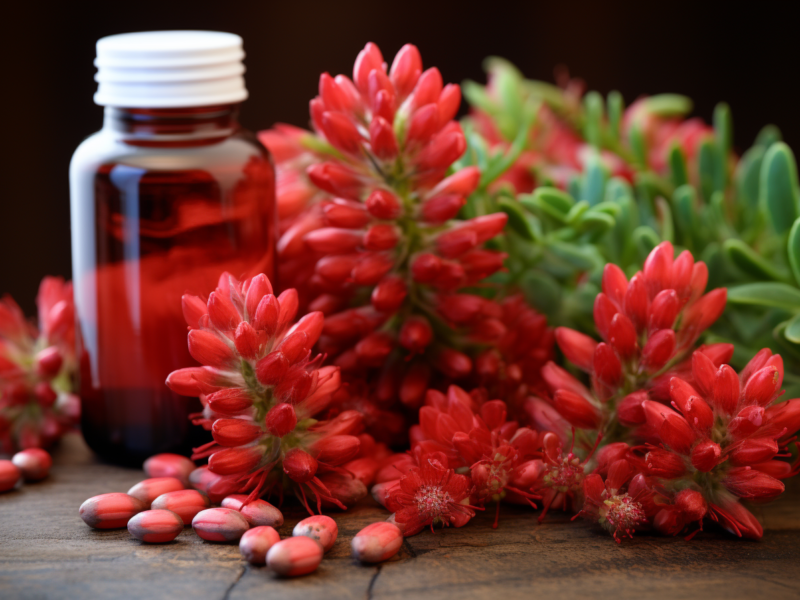Introduction to Rhodiola Rosea
Rhodiola rosea, also known as the ‘golden root’, is an herb with a long history of use in traditional medicine. It has been used to treat various aspects of health, including fatigue, depression, and anxiety. It is also known as an adaptogen, meaning it helps the body adapt to physical and mental stress.
Recent clinical studies have shown that rhodiola rosea supplementation can have significant effects on mental performance, mild to moderate depression, and chronic fatigue symptoms. A systematic review and meta-analysis of randomized controlled trials found that rhodiola rosea extract had a positive effect on anxiety and depression. Additionally, a placebo-controlled pilot study demonstrated the remediating effects of a standardized extract shr-5 on the fatigue caused by stress during an examination period. Clinical evidence has also shown that rhodiola rosea supplementation can improve symptoms of depression, reduce stress hormones, and enhance mood. Furthermore, a double-blind cross-over study of a standardized extract shr-5 with a repeated dose of rhodiola rosea l found that it had a positive effect on mental and physical fatigue.
Clinical Studies on Rhodiola Rosea
Rhodiola rosea is an adaptogenic herb that has been used for centuries to treat various health conditions. It has been studied in clinical trials to assess its potential benefits for stress symptoms, fatigue and depression. In one study, a dietary supplement containing a Rhodiola rosea extract was used to treat mild anxiety and self-reported anxiety in students caused by stress. The results showed a significant improvement in anxiety and mood after one week of treatment. Additionally, a double blind cross-over study demonstrated the remediating effects of a Rhodiola rosea extract on 5-HT levels and anxiety in patients with mild-to-moderate depression.

In another clinical trial, a Rhodiola rosea extract was used to treat major depressive disorder.
The results showed that the extract was as effective as the antidepressant sertraline in treating depression. Furthermore, a pilot study of the stimulating effects of a Rhodiola rosea extract on anxiety showed that it could improve physical stress and reduce fatigue and depression.
Rhodiola rosea has also been shown to improve cardiovascular and reproductive health by addressing non-specific stress damage and reversing the effects of chronic stress. It has been found to have numerous health benefits, including anti-inflammatory effects, and is a popular supplement for addressing non-specific stress damage and reversing the effects of chronic stress. Additionally, Rhodiola rosea supplementation has been shown to improve sport performance and has a long history of medicinal use.
Benefits of Taking Rhodiola Rosea
Taking Rhodiola Rosea has a plethora of benefits. It is an adaptogen, meaning it helps the body adapt to stress and has been used for centuries to treat various symptoms associated with stress. Rhodiola has been shown to reduce stress response, depression rating, and fatigue. Additionally, it has been demonstrated to have a positive effect on the central nervous system.
A study conducted on the effects of Rhodiola Rosea supplementation found that it had a positive effect on the fatigue and oxidative stress caused by prolonged or chronic fatigue symptoms. Furthermore, it was found that Rhodiola Rosea had a positive effect on mild-to-moderate depression, with some studies showing that it was as effective as sertraline for major depressive disorder. Additionally, it has been demonstrated to have a positive effect on symptoms associated with stress, such as anxiety. Furthermore, Rhodiola Rosea has been found to have positive effects on sport performance, with some studies showing that it can improve physical performance. Finally, Rhodiola Rosea has been found to have no adverse effects, making it a safe and effective treatment for depression.
How to Take Rhodiola Rosea
Taking Rhodiola Rosea is a great way to get the benefits of this adaptogen. It is a stimulant that works on the central nervous system to help reduce fatigue and improve mental performance. The shr-5 extract of Rhodiola Rosea is commonly used to treat generalized anxiety disorder and depression. Additionally, studies have demonstrated the remediating effects of Rhodiola Rosea supplementation on sport performance.
The effects of an acute Rhodiola extract have been found to be beneficial for treating depression and anxiety. Additionally, long-term effects of Rhodiola root supplementation have been found to have clinical efficacy for various stress induced conditions. The benefits of Rhodiola Rosea are numerous and include improved mental performance, increased energy, and improved mood. It is important to note that Rhodiola Rosea is an adaptogen and should be taken as directed to get the most out of its effects.
Potential Side Effects of Rhodiola Rosea
Rhodiola rosea is a herb that has been used for centuries to treat fatigue and improve physical and mental performance. It’s a shr-5 extract that has been found to have a number of potential side effects. Studies have shown that rhodiola supplementation can reduce fatigue and improve sport performance.

Additionally, it has been demonstrated to have remediating effects on the fatigue associated with physical and mental stress. However, there are some potential side effects associated with rhodiola rosea. These include headaches, dizziness, dry mouth, and insomnia.
Additionally, some people may experience an increase in heart rate and blood pressure.
It’s important to note that these side effects are rare and usually mild. To reduce the risk of experiencing any of these side effects, it’s important to take rhodiola supplements as directed and to consult with a healthcare professional before taking any supplement. With the right dosage and careful monitoring, the clinical efficacy of various rhodiola supplements can be maximized.
Conclusion
In conclusion, the use of Rhodiola rosea extract (SHR-5) has been demonstrated to have a positive effect on fatigue. Additionally, the remediating effects of Rhodiola rosea supplementation have been found to improve sport performance. Rhodiola rosea is a plant found in the arctic regions of Europe and Asia and has been used for centuries in traditional medicine. The active compounds in Rhodiola rosea are believed to be responsible for its anti-fatigue and performance-enhancing effects. Studies have shown that Rhodiola rosea extract can reduce fatigue and improve physical and mental performance. Furthermore, Rhodiola rosea supplementation has been found to improve exercise performance, reduce fatigue, and improve recovery time. In summary, Rhodiola rosea extract (SHR-5) has been demonstrated to have a positive effect on fatigue and to improve sport performance. Therefore, Rhodiola rosea supplementation may be beneficial for athletes and those looking to improve their physical and mental performance.

FAQ’s:
Q1. What is Rhodiola Rosea?
A1. Rhodiola Rosea is an herb that has been used for centuries to help improve mood and reduce fatigue.
Q2. What is SHR-5 extract?
A2. SHR-5 extract is a standardized extract of Rhodiola Rosea that has been found to have mood enhancing effects.
Q3. How does Rhodiola Rosea help with fatigue?
A3. Studies have demonstrated the remediating effects of Rhodiola Rosea on fatigue. Additionally, supplementation with Rhodiola Rosea has been found to reduce fatigue and improve overall energy levels.
Q4. What are the benefits of using Rhodiola Rosea?
A4. Rhodiola Rosea has been found to have a variety of benefits, including mood enhancement, fatigue reduction, and improved sport performance.
Q5. What are the side effects of using Rhodiola Rosea?
A5. Rhodiola Rosea is generally considered safe and has few side effects. However, it is important to consult with a healthcare professional before taking any supplement.
Q6. How can Rhodiola Rosea be used to improve sport performance?
A6. Studies have found that supplementation with Rhodiola Rosea can improve sport performance by reducing fatigue and improving overall energy levels.
Q7. What other compounds are found in Rhodiola Rosea?
A7. Rhodiola Rosea contains a variety of compounds, including rosavins, salidroside, and tyrosol.



 Rhodiola Rosea As An Adaptogen
Rhodiola Rosea As An Adaptogen
